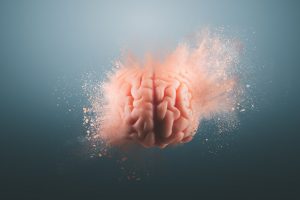Many women going through menopause report a phenomenon they refer to as “brain fog,” a combination of forgetfulness, reduced concentration, and mental exhaustion. It is believed that these symptoms are partly due to hormonal fluctuations that occur during this transitional phase. To better understand this connection, researchers have conducted an evaluation of existing studies that examined how menopause affects brain structure and its relationship to cognitive, emotional, and physical health.
How Menopause Changes Brain Structure
Research has shown that menopause is associated with measurable structural changes in the brain. Several studies have found a decrease in gray matter volume in important regions such as the frontal and temporal cortex and the hippocampus, which play an important role in memory and decision-making. These decreases have been linked to a decline in certain types of memory performance, including verbal and visual-spatial abilities.
Other research has found that white matter hyperintensities—bright spots visible on MRI scans that often indicate tissue damage—are more common during menopause, especially in women who experience early menopause or frequent hot flashes. These changes may be due to reduced blood flow to the white matter of the brain. The lesions are associated with a higher risk of neurological symptoms such as cognitive decline, balance disorders, mood swings, and an increased likelihood of stroke and dementia.
Evidence of Brain Recovery and Hormonal Adaptation

Interestingly, some findings suggest that gray matter volume may partially recover after menopause, indicating the brain’s ability to adapt through neuroplasticity. Scientists have also observed higher estrogen receptor density during menopause, which may reflect the brain’s attempt to compensate for declining hormone levels. However, this increase has also been associated with weaker memory performance in some cases. Changes in blood vessel reactivity and energy metabolism in the brain further illustrate how menopause affects the health and resilience of nerve cells.
Some evidence suggests a partial recovery in gray matter volume after menopause, possibly reflecting compensatory neuroplastic processes. In addition, increased estrogen receptor density during menopause may represent an adaptive response to declining hormone levels, although it has also been associated with poorer memory performance. Changes in cerebrovascular reactivity and brain energy metabolism further underscore the influence of menopause on neuronal integrity and functional resilience.
Identifying Effective Therapies
As part of a project conducted at the BRAVE Lab at the School of Behavioral and Brain Sciences at Ponce Health Sciences University (Puerto Rico), doctoral students Angélica Rodríguez and Andrea Pereira conducted a bibliographic review under the supervision of Dr. Bárbara Barros and Dr. Karla Martínez. In their work, they analyzed relevant scientific literature on menopause-related structural changes in the brain and how these changes may contribute to menopausal symptoms.
“This type of work highlights the need to further explore the relationship between the brain and menopause, particularly its connection to the cognitive, emotional, and behavioral symptoms women experience during this phase,” says Angélica Rodríguez, a doctoral student in psychology at Ponce Health Sciences University in Puerto Rico. “This study represents the totality of scientific knowledge about structural changes that occur in the brain during menopause,” says Dr. Stephanie Faubion, medical director of the Menopause Society. “Hopefully, this data will lead to a better understanding of the factors underlying some of the cognitive issues women struggle with during menopause, so that we can ultimately identify effective therapies.”





